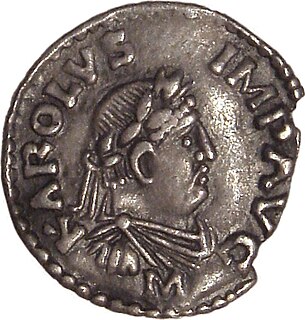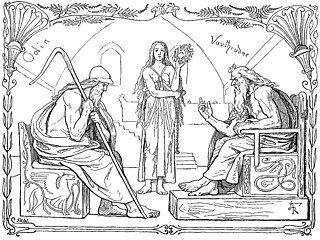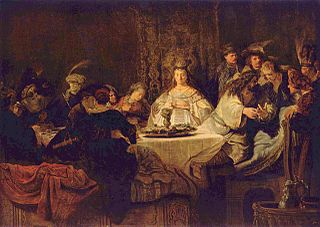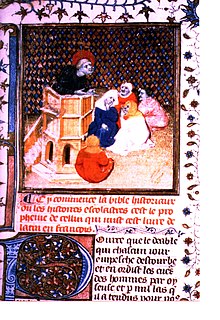Related Research Articles

The Book of Job addresses the problem of theodicy, meaning why God permits evil in the world, through the experiences of the eponymous protagonist. Job is a wealthy and God-fearing man with a comfortable life and a large family; God, having asked Satan for his opinion of Job's piety, decides to take away Job's wealth, family and material comforts, following Satan's accusation that if Job were rendered penniless and without his family, he would turn away from God.

Charlemagne or Charles the Great was King of the Franks from 768, King of the Lombards from 774, and Emperor of the Romans from 800. During the Early Middle Ages, Charlemagne united the majority of western and central Europe. He was the first recognized emperor to rule from western Europe since the fall of the Western Roman Empire around three centuries earlier. The expanded Frankish state that Charlemagne founded is known as the Carolingian Empire. He was later canonised by Antipope Paschal III, and is regarded as beatified, which is a step on the path to sainthood, by the mainstream Catholic Church.
A kōan (公案) is a story, dialogue, question, or statement which is used in Zen practice to provoke the "great doubt" and to practice or test a student's progress in Zen.
Old English literature, or Anglo-Saxon literature, encompasses literature written in Old English, in early medieval England from the 7th century to the decades after the Norman Conquest of 1066. According to Bede, the 7th century work Cædmon's Hymn is considered as the oldest surviving poem in English. Poetry written in the mid-12th century represents some of the latest post-Norman examples of Old English. For example, The Soul's Address to the Body found in Worcester Cathedral Library MS F. 174 contains only one word of possible Latinate origin, while also maintaining a corrupt alliterative meter and Old English grammar and syntax, albeit in a degenerative state. The Peterborough Chronicle can also be considered a late-period text, continuing into the 12th century. The strict adherence to the grammatical rules of Old English is largely inconsistent in 12th century work – as is evident in the works cited above – and by the 13th century the grammar and syntax of Old English had almost completely deteriorated, giving way to the much larger Middle English corpus of literature.

Boniface, born in the Crediton in Anglo-Saxon England, was a leading figure in the Anglo-Saxon mission to the Germanic parts of the Frankish Empire during the 8th century. He organised significant foundations of the church in Germany and was made archbishop of Mainz by Pope Gregory III. He was martyred in Frisia in 754, along with 52 others, and his remains were returned to Fulda, where they rest in a sarcophagus which became a site of pilgrimage. Boniface's life and death as well as his work became widely known, there being a wealth of material available—a number of vitae, especially the near-contemporary Vita Bonifatii auctore Willibaldi, legal documents, possibly some sermons, and above all his correspondence. He is venerated as a saint in the Christian church and became the patron saint of Germania, known as the "Apostle to the Germans".

Vafþrúðnir is a wise jötunn in Norse mythology. His name comes from Vaf, which means weave or entangle, and thrudnir, which means strong or mighty. Some interpret it to mean "mighty in riddles". It may be anglicized Vafthruthnir or Vafthrudnir. In the Poetic Edda poem Vafþrúðnismál, Vafþrúðnir acts as Odin's host and opponent in a deadly battle of wits that results in Vafþrúðnir's defeat.

The Irminones, also referred to as Herminones or Hermiones, were a large group of early Germanic tribes settling in the Elbe watershed and by the 1st century AD expanding into Bavaria, Swabia and Bohemia. Notably this included the large sub-group of the Suevi, that itself contained many different tribal groups, but the Irminones also for example included the Chatti.

The Carolingian Renaissance was the first of three medieval renaissances, a period of cultural activity in the Carolingian Empire. It occurred from the late 8th century to the 9th century, taking inspiration from the Christian Roman Empire of the fourth century. During this period, there was an increase of literature, writing, the arts, architecture, jurisprudence, liturgical reforms, and scriptural studies.

The Norsemen were a North Germanic ethnolinguistic group of the Early Middle Ages, during which they spoke the Old Norse language. The language belongs to the North Germanic branch of the Indo-European languages and is the predecessor of the modern Germanic languages of Scandinavia. During the late eighth century, Scandinavians embarked on a large-scale expansion in all directions, giving rise to the Viking Age. In English-language scholarship since the 19th century, Norse seafaring traders, settlers and warriors have commonly been referred to as Vikings. Historians of Anglo-Saxon England distinguish between Norse Vikings (Norsemen) from Norway who mainly invaded and occupied the islands north and north-west of Britain, Ireland and western Britain, and Danish Vikings, who principally invaded and occupied eastern Britain.

A riddle is a statement, question or phrase having a double or veiled meaning, put forth as a puzzle to be solved. Riddles are of two types: enigmas, which are problems generally expressed in metaphorical or allegorical language that require ingenuity and careful thinking for their solution, and conundra, which are questions relying for their effects on punning in either the question or the answer.
Old French was the language spoken in Northern France from the 8th century to the 14th century. Rather than a unified language, Old French was really a linkage of Romance dialects, mutually intelligible yet diverse, spoken in the northern half of France.

Wycliffe's Bible is the name now given to a group of Bible translations into Middle English that were made under the direction of John Wycliffe. They appeared over a period from approximately 1382 to 1395. These Bible translations were the chief inspiration and chief cause of the Lollard movement, a pre-Reformation movement that rejected many of the distinctive teachings of the Roman Catholic Church. In the early Middle Ages, most Western Christian people encountered the Bible only in the form of oral versions of scriptures, verses and homilies in Latin. Though relatively few people could read at this time, Wycliffe's idea was to translate the Bible into the vernacular, saying "it helpeth Christian men to study the Gospel in that tongue in which they know best Christ's sentence".
An elephant joke is a joke cycle, almost always an absurd riddle or conundrum and often a sequence of such, that involves an elephant. Elephant jokes were a fad in the 1960s, with many people constructing large numbers of them according to a set formula. Sometimes they involve parodies or puns.

Eusebian canons, Eusebian sections or Eusebian apparatus, also known as Ammonian sections, are the system of dividing the four Gospels used between late Antiquity and the Middle Ages. The divisions into chapters and verses used in modern texts date only from the 13th and 16th centuries, respectively. The sections are indicated in the margin of nearly all Greek and Latin manuscripts of the Bible, and usually summarized in canon tables at the start of the Gospels. There are about 1165 sections: 355 for Matthew, 235 for Mark, 343 for Luke, and 232 for John; the numbers, however, vary slightly in different manuscripts.

The Bible Historiale was the predominant medieval translation of the Bible into French. It translates from the Latin Vulgate significant portions from the Bible accompanied by selections from the Historia Scholastica by Peter Comestor, a literal-historical commentary that summarizes and interprets episodes from the historical books of the Bible and situates them chronologically with respect to events from pagan history and mythology.
Peter of Pisa, also known as Petrus Grammaticus, was an Italian grammarian, deacon and poet in the Early Middle Ages. In 776, after Charlemagne's conquest of the Lombard Kingdom, Peter was summoned to the Carolingian court along with Paul the Deacon and Alcuin. Peter had originally taught at Pavia, in Italy. Peter of Pisa was asked to be Charlemagne’s primary Latin teacher. Peter’s poetry provides a personal look at the workings of the innermost sanctum surrounding Charlemagne. Peter’s grammar texts provide insight into the transformation Latin education underwent in this period.
The Prebiarum de multorum exemplaribus is a Hiberno-Latin interrogatory florilegium of the mid-8th century, written as a dialogue in a series of 93 short questions and answers. The word prebiarum seems to be a corruption of breviarium, though the work is not a breviary in the usual sense; the title is not customarily translated into English, but would mean something like "A Breviary of Examples from Many Sources". The Latin dialogue makes use of triads, a tripartite form of expression characteristic of early Irish literature. Its subject matter is exegetical or didactic; that is, it seeks to explain or teach, often through an enumeration of its points.
"Pharaoh" is the editorial name given to a fragmentary, eight-line Old English poem on folio 122r of the later tenth-century anthology known as the Exeter Book.
Adrian and Ritheus is an Old English prose literary text preserved in British Library manuscript Cotton Julius A ii, fols 137v-140. It consists of a dialogue of forty-eight formulaic questions and answers between the titular 'Adrianus' and 'Ritheus'. Adrianus interrogates Ritheus using the formulaic expression Saga me ; Ritheus responds using the formulaic Ic þe secge. The nature of the questions posed varies between the factual and the enigmatic, but the style of questioning is "usually short and to the point".

The Frankish Table of Nations is a brief early medieval genealogical text in Latin giving the supposed relationship between thirteen nations descended from three brothers. The nations are the Ostrogoths, Visigoths, Vandals, Gepids, Saxons, Burgundians, Thuringians, Lombards, Bavarians, Romans, Bretons, Franks and Alamanni.
References
- 1 2 3 4 Walter Goffart, "The Supposedly 'Frankish' Table of Nations: An Edition and Study", Frühmittelalterliche Studien17 (1983): 98–130, esp. at 128–130.
- 1 2 3 4 5 Charles D. Wright, "From Monks' Jokes to Sages' Wisdom: The Joca Monachorum Tradition and the Irish Immacallam in dá Thúarad", in Mary Garrison, Arpad P. Orbán and Marco Mostert (eds.) Spoken and Written Language: Relations between Latin and the Vernacular Languages in the Earlier Middle Ages (Brepols, 2013), pp. 199–225.
- 1 2 3 George Ferzoco, "Joca (Ioca) monachorum" in Robert E. Bjork (ed.), The Oxford Dictionary of the Middle Ages (Oxford University Press, 2010). Retrieved 17 March 2020.
- 1 2 3 Jacques Dubois, "Comment lest moines du moyen âge chantaient et goutâient les Sainte Écritures", in Pierre Riché and Guy Lobrichon (eds.), Le Moyen Âge et la Bible (Beauchesne, 1984), pp. 264–270.
- 1 2 3 4 Erik Wahlgren, "A Swedish-Latin Parallel to the Joca Monachorum", Modern Philology36 (1939): 239–245.